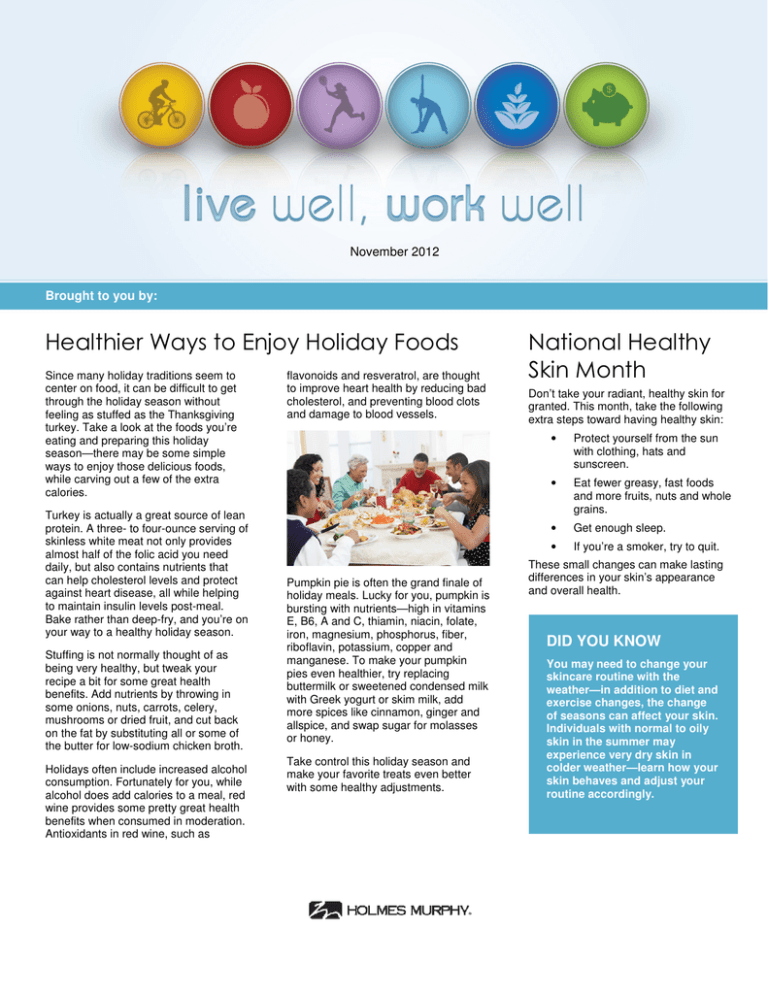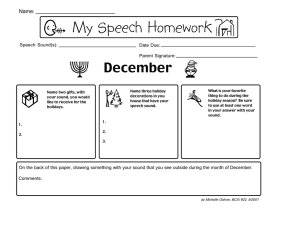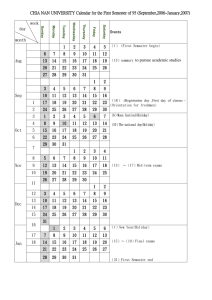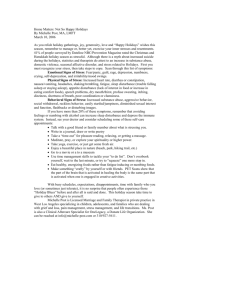Healthier Ways to Enjoy Holiday Foods National Healthy Skin Month November 2012
advertisement

November 2012 Brought to you by: Healthier Ways to Enjoy Holiday Foods Since many holiday traditions seem to center on food, it can be difficult to get through the holiday season without feeling as stuffed as the Thanksgiving turkey. Take a look at the foods you’re eating and preparing this holiday season—there may be some simple ways to enjoy those delicious foods, while carving out a few of the extra calories. Turkey is actually a great source of lean protein. A three- to four-ounce serving of skinless white meat not only provides almost half of the folic acid you need daily, but also contains nutrients that can help cholesterol levels and protect against heart disease, all while helping to maintain insulin levels post-meal. Bake rather than deep-fry, and you’re on your way to a healthy holiday season. Stuffing is not normally thought of as being very healthy, but tweak your recipe a bit for some great health benefits. Add nutrients by throwing in some onions, nuts, carrots, celery, mushrooms or dried fruit, and cut back on the fat by substituting all or some of the butter for low-sodium chicken broth. Holidays often include increased alcohol consumption. Fortunately for you, while alcohol does add calories to a meal, red wine provides some pretty great health benefits when consumed in moderation. Antioxidants in red wine, such as flavonoids and resveratrol, are thought to improve heart health by reducing bad cholesterol, and preventing blood clots and damage to blood vessels. Pumpkin pie is often the grand finale of holiday meals. Lucky for you, pumpkin is bursting with nutrients—high in vitamins E, B6, A and C, thiamin, niacin, folate, iron, magnesium, phosphorus, fiber, riboflavin, potassium, copper and manganese. To make your pumpkin pies even healthier, try replacing buttermilk or sweetened condensed milk with Greek yogurt or skim milk, add more spices like cinnamon, ginger and allspice, and swap sugar for molasses or honey. Take control this holiday season and make your favorite treats even better with some healthy adjustments. National Healthy Skin Month Don’t take your radiant, healthy skin for granted. This month, take the following extra steps toward having healthy skin: • Protect yourself from the sun with clothing, hats and sunscreen. • Eat fewer greasy, fast foods and more fruits, nuts and whole grains. • Get enough sleep. • If you’re a smoker, try to quit. These small changes can make lasting differences in your skin’s appearance and overall health. DID YOU KNOW You may need to change your skincare routine with the weather—in addition to diet and exercise changes, the change of seasons can affect your skin. Individuals with normal to oily skin in the summer may experience very dry skin in colder weather—learn how your skin behaves and adjust your routine accordingly. 4 Tips for Fighting the Flu Flu season is here, and taking the following four simple steps to protect yourself is important. 1. 2. 3. 4. Get a flu vaccine—The earlier you receive your vaccine, the less likely you are to get the flu. If you are allergic to eggs, however, you should skip the flu vaccine, as it is made with eggs. Keep your hands clean—Wash your hands even more frequently and keep anti-bacterial hand sanitizer handy. Improve your diet—Eating fresh fruits and vegetables that are rich in nutrients will strengthen your immune system. Exercise more—Immune function increases with exercise, as do energy levels. Cold-weather Energy Savings Energy bills can skyrocket in the colder months. From using more heat to keeping more lights on when it gets dark early, limiting energy consumption becomes even more important in the winter. Follow these tips for conserving energy in cooler weather: • • • • • Set your thermostat lower when you’re not home, or even while you are asleep. Even lowering the heat from 70 to 65 degrees Fahrenheit can make your bills shrink. Use a portable, electric space heater. Space heaters are energy-efficient and are especially useful when most of your time is spent in one or two rooms—you won’t be bothered by a lower thermostat temperature if the space you’re in is nice and cozy. Make sure to research fire safety when using a space heater. Make sure doors and windows seal tightly. If they don’t, fix them to avoid cold air seeping in and warm air escaping. Insulate your pipes, even the cold water ones. In addition to preventing your pipes from bursting, insulating them with half-inch thick foam can save you about $25 annually. Lower your water heater to 120 degrees Fahrenheit. If your water is being heated to a lower temperature, the bill will decrease. Also, consider swapping your electric water heater with a less-expensive natural gas one. Be aware of your energy usage as winter approaches—lowering it can save you quite a bit of money. Green Bean Casserole Transform this kid-favorite into something everyone can enjoy by replacing packaged and canned ingredients with fresher, healthier alternatives. This recipe is the perfect side for holiday meals. 1 tsp. cooking oil ¼ cup chopped onion 2 tbsp. flour 1 cup skim milk 1/3 cup shredded, reduced-fat Swiss cheese ½ cup low-fat sour cream 1 tsp. sugar ¼ tsp. salt 1 (16 oz.) package frozen green beans, thawed and drained 1 cup herb-seasoned stuffing mix 1 tsp. margarine, melted In a medium saucepan, sauté onion in cooking oil. Add flour and cook 1 minute. Gradually add milk, stirring until blended. Stir in cheese, sour cream, sugar and salt; cook for 5 minutes or until thickened and bubbly, stirring constantly. Put green beans in a baking dish; pour the sauce over the top. In another bowl, pour the melted margarine over the stuffing mix; stir well and sprinkle over green bean mixture. Bake at 350 degrees for 20 to 25 minutes or until heated through. Yield: 8 servings. Each serving provides 106 calories, 5g total fat, 2g saturated fat, 5g protein and 186 mg sodium. Source: https://doh.sd.gov This brochure is for informational purposes only and is not intended as medical advice. For further information, please consult a medical professional. © 2012 Zywave, Inc. All rights reserved.





